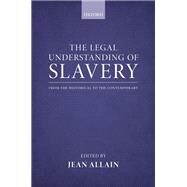The Legal Understanding of Slavery From the Historical to the Contemporary
, by Allain, Jean- ISBN: 9780199660469 | 0199660468
- Cover: Hardcover
- Copyright: 11/25/2012
"Slavery is the status or condition of a person over whom any or all of the powers attaching to the right of ownership are exercised." So reads the legal definition of slavery agreed by the League of Nations in 1926. Further enshrined in law during international negotiations in 1956 and 1998, this definition has been interpreted in different ways by the international courts in the intervening years. What can be considered slavery? Should forced labour be considered slavery? Debt-bondage? Child soldiering? Or forced marriage? This book explores the limits of how slavery is understood in law. It shows how the definition of slavery in law and the contemporary understanding of slavery has continually evolved and continues to be contentious. It traces the evolution of concepts of slavery, from Roman law through the Middle Ages, the 18th and 19th centuries, up to the modern day manifestations, including manifestations of forced labour and trafficking in persons, and considers how the 1926 definition can distinguish slavery from lesser servitudes. Together the contributors have put together a set of guidelines intended to clarify the law where slavery is concerned.The Bellagio-Harvard Guidelines on the Legal Parameters of Slavery,reproduced here for the first time, takes their shared understanding of both the past and present to project a consistent interpretation of the legal definition of slavery for the future.







